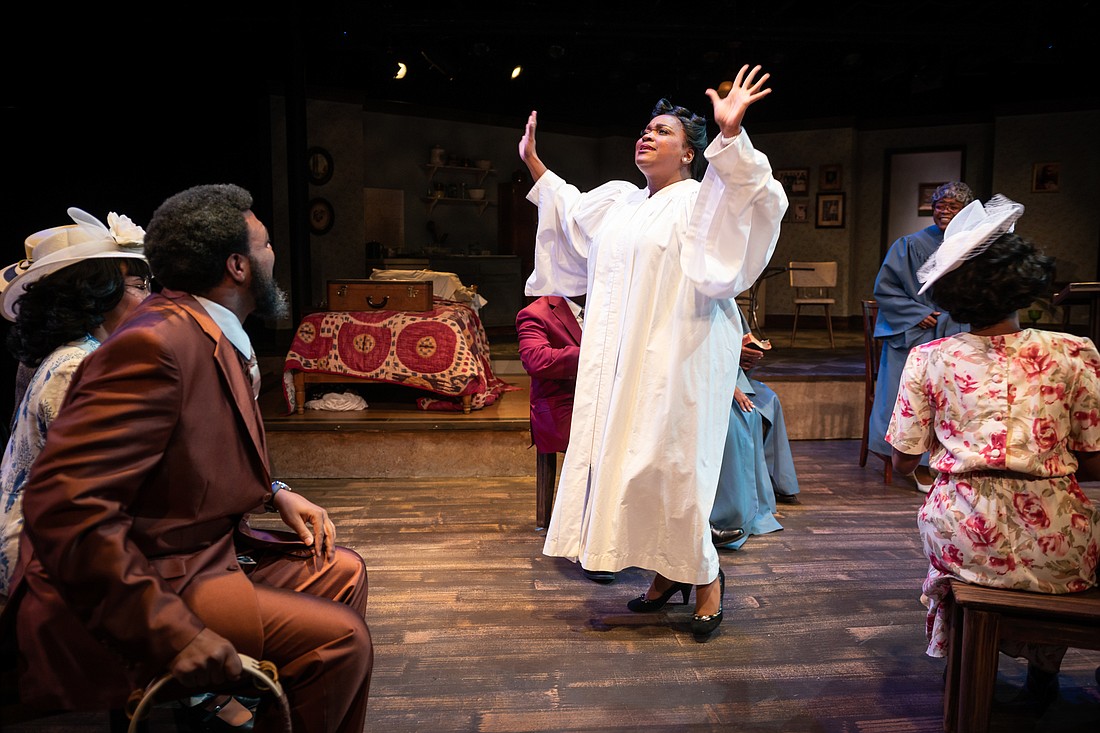- July 26, 2024
-
-
Loading

Loading

James Baldwin’s “The Amen Corner” explores the downfall of Sister Margaret, the all-too-human spiritual leader of an African-American storefront church. Director Chuck Smith is telling her story on the Westcoast Black Theatre Troupe stage. He’s told her story before — in acclaimed productions at The Goodman Theatre in Chicago and The Huntington Theatre in Boston in 2001 — but as Smith sees it, there are no reruns in live theater. Here’s his take on the power of Baldwin’s lesser-known play.
It’s an African-American storefront church — and they are not obsolete. If you go to any black community, you’ll still find a whole lot of storefront churches. This is the story of one of them.
The play is essentially the tragedy of Sister Margaret, and that works on two levels. It’s both her tragic love story and a spiritual tragedy for the whole church. Her downfall begins with seemingly innocent complaints in the congregation.
Money. Small stuff. But small stuff is big stuff. How much did that Frigidaire cost? Why didn’t you take the bus?
They don’t have to. It’s always imply, imply — never a direct attack. But you see who planted the seeds of discontent, and you see how they grow to the point of no return. Then Sister Margaret’s husband, Luke, reappears, and that causes chaos in the church and in her life.
I’d say he’s more like the excuse. For the elders who want to replace Sister Margaret, he’s the perfect excuse — but they were already working against her. They ultimately betray Sister Margaret in an act of treachery motivated by ambition. Once the play gets rolling, it’s very Shakespearean.
Sister Moore. She covets Sister Margaret’s position of authority. She appears to be in her corner — and then you start to see that Sister Moore has her own agenda.
Yes. And that’s the ending to her earthly love story. She grows to understand the true meaning of love and faith. By the end of play, she realizes that Luke is pretty much her salvation.
I’d say it’s more like his critique of judgmental Christians.
Yes, it was. James Baldwin grew up in a storefront church. His stepfather was the preacher. James broke away and became a teenage preacher in another church. That was his act of youthful rebellion.
Oh, yes, it is. You can look at two characters in this play and say, “There’s James Baldwin.” The son, definitely. But also a minor role — Ida Jackson. She has only two brief appearances. When she speaks, you can hear his voice quite strong.
Intellectually, my idea of this play hasn’t changed much. But directing isn’t an intellectual process; it’s a human process. When you work with a new set of talented actors, they bring a different energy. You just ride with that energy, and that’s what I’m doing here. Each actor brings their own point of view, their own unique rhythm. Working with the same script and a different cast, you’ll wind up with a whole new experience on stage. And we do. I can guarantee it won’t be a rerun. I’m using the same music design, but that’s the only holdover from my old production. Some of the hymns are in the original play; I added a few more. Music is such a key element in “The Amen Corner.”
Well, this is not a short play. Take the music away, and you’re left with a lot of talk. For me, this play needs the juice of a good gospel choir to keep things rolling along. Fortunately, I’m working with so many great voices here. Westcoast Black Theatre Troupe is known for its musical talent — and acting talent, too. It’s a double threat.
It’s been a complete joy. They’re such amazingly talented singing actors. “The Amen Corner” demands that level of talent across the board. Without a great ensemble, you don’t stand a ghost of a chance doing this play.
“The Amen Corner” is the tragedy of Sister Margaret, but James Baldwin is also showing us a microcosm of the whole church. Sister Margaret is the lead character, but the supporting roles are all so strong. You need a strong ensemble to bring them to life, and these actors have got what it takes. I love ensemble work, especially working with such a talented cast. They jump into everything I want them to do.
They’ll find themselves immersed in the inner workings of an African-American storefront church and the lives of its congregation. Unless you grew up in that experience, it’ll be an entirely new experience — a new world, as you said. We invite the whole community to join us. Even if you’ve seen this play before, I guarantee you’ll see something new.